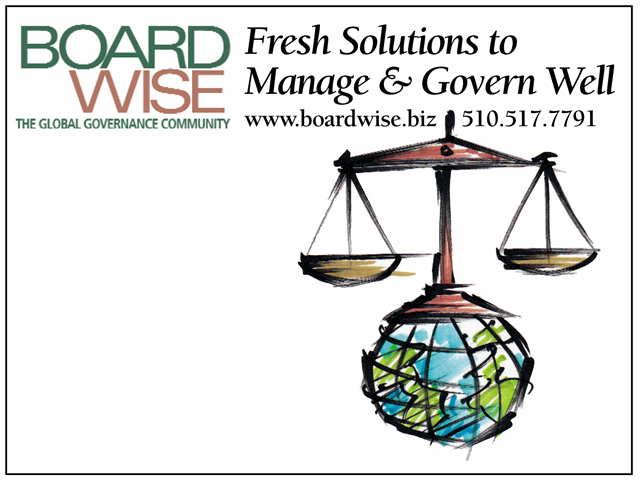The Self-Managing Board of Directors

Guest Author: Doug Kirpatrick
The Enron scandal and bankruptcy of the early 2000s was a financial debacle for thousands, sent former CEOs to prison, and led to the extinction of a Big Five accounting firm. It also transformed corporate governance, ushering in the era of Sarbanes-Oxley transparency and accountability. Important transactions into which Enron entered with Board approval suffered from crucial accounting and governance defects.[i]
As Enron’ implosion and later investigation demonstrated, the director’s job in a non-profit, foundation or corporate setting can be maddeningly complex. Are agency relationships correctly aligned so that agents act in a fiduciary capacity on behalf of the principals they are supposed to represent? Should the CEO participate as a full board member with voting rights? How does the board review and approve strategic plans? Are there conflicts of interest? How does the board recruit new members? How does the board review executive performance? How does the board monitor its own performance, if at all?
Francie Ostrower of the University of Texas in Austin served as the principal investigator for a 2005 study of over 5,100 nonprofit organizations for the Urban Institute National Survey of Nonprofit Governance.[ii] The study found that a significant percentage of boards were not engaged in many fundamental roles. Forty-five percent of respondents reported that their boards are not even somewhat active in monitoring the board’s performance. Nearly one-fourth of respondents do not regularly evaluate whether their organization is even accomplishing its mission.
Corporate boards (like Enron’s) are vulnerable to governance failures. While such failures are often attributed to incompetence or lack of incentives, a review of nearly 300 academic journal articles on board governance by a team of researchers concluded that even competent, motivated board members face challenges in monitoring management because of a variety of
structural barriers like external job demands, board size and business complexity.[iii]
How can board effectiveness be improved? Studies suggest possible approaches. A follow-up study to the Urban Institute found that encouraging board members to influence the board agenda was associated with higher engagement.[iv] Chuck Blakeman’s Crankset Group uses a shared online document that allows team members create a monthly meeting agenda.[v] In such as system, team members can take ownership of their self-selected agenda items and facilitate discussion of those items. Boards of Directors could fashion similar structures to drive engagement. Given the prevalence of board member role dissatisfaction, some researchers argue that directors should pursue a generative mode beyond finance and strategy to probe topics like value and purpose.[vi]
Open social technologies like Open Space and World Café can be thoughtfully and selectively employed to energize, augment and expand traditional board discussions around fiduciary and strategy topics. These social technologies have the added benefit of ensuring that every voice is heard, contributing to better decisions.
For that matter, why not invite directors to creatively sculpt board roles that fit their interests, so long as the board collectively fulfills its mandatory responsibilities and effectively allocates decision rights? While not obviating the role of standard committees, an open invitation process would encourage directors to think deeply about aligning their personal board roles and areas of interest.
While the complex agency relationships and decision rights of boards will continue to present challenges and tradeoffs, there is no reason to silently suffer director disengagement and lethargy (which surely affects recruitment). There are social technologies readily available to engage directors and align their interests with the principals they represent.
Fully engaged, self-managing board members creating their own agendas together, learning together and invitationally leading together while simultaneously fulfilling vital legal, fiduciary and strategic responsibilities would seem to be an experiment worth trying.
[i] https://scholarship.law.upenn.edu/cgi/viewcontent.cgi?article=1009&context=fisch_2016
[ii] https://www.urban.org/research/publication/nonprofit-governance-united-states
[iii] https://www.ideasforleaders.com/ideas/why-boards-of-directors-fail-at-monitoring-their-companies
[iv]
Boards as an Accountability Mechanism, Francie Ostrower, University of Texas at Austin, 2014, p. 11.
[v] https://www.inc.com/chuck-blakeman/great-companies-are-making-all-meetings-optional.html
[vi]
Boards as an Accountability Mechanism, Francie Ostrower, University of Texas at Austin, 2014, p. 20.

Doug Kirkpatrick is an organizational change consultant, TEDx and Forbes Speaker, executive coach, author, and educator. He recently released his third book,
The No-Limits Enterprise: Organizational Self-Management in the New World of Work with Forbes Books, and is a partner in NuFocus Strategic Group, an international consulting firm helping companies embrace the future of work. A member of the Forbes Speakers network, he has served as a director on a number of boards including the Association for Talent Development (ATD), the world’s largest talent development association with 35,000+ members in 120 countries, and the Leadership Institute for Development, Education and Research (LiDER) to develop leaders throughout the Americas.
Boardwise Welcomes New Strategic Partner:
Consultants Collective

Boardwise is delighted to announces its strategic partnership with Consultants Collective to extend its management consulting and advisory services to the board and management level.
“Boards are increasingly focusing on a range of new issues, including data and digital governance, data privacy compliance, cyber security, employee activism, brand reputation, sustainability, inclusion and more. Through this partnership, we will supplement our core offerings with consulting and advisory services, insights and expertise around these new issues at the senior management and board level. We are delighted to work with Jen McClure CEO, JEM and managing director, and her team at Consultants Collective” notes Donna Hamlin, Boardwise CEO.
About Consultants Collective
Consultants Collective is the consulting division of JEM, a Silicon Valley-based global management consulting, publishing and research firm – named one of Business Insider’s “Power Players” – in its first list of the most influential leaders and top disruptors in management consulting. Consultants Collective offers a new approach to management consulting. The Collective’s member consultants, advisors and executive coaches all have executive-level experience at world-class organizations. Consultants Collective is a certified Women-Owned Small Business in the Federal Contracting Program, and is recognized as a Women-Owned Small Business (WOSB) by the Department of Defense (DOD). www.consultantscollective.net
Our Mission
Boardwise supports companies on all governance matters globally. Our goal is to help boards to constantly increase their contribution to organizational performance. Four key service areas are:
1) advice and consulting assistance with board practices, new board and advisory board development, policies, group dynamics, management and board collaboration, succession and talent composition planning;
2) independent board evaluations and recommendations for best practices in governance;
3) customized research and access to global experts on all board topics, e.g., international compliance issues, trends and changes in governance practices, compensation data,
4) director certification and placement, including internationally recognized premier Board Bona FIde® board assessments to qualify and vet candidates and source and place directors globally. We provide certification programs in global governance and continuing education on hot topics in governance matters.
Count on us to find answers to your questions and to offer fresh solutions to manage and govern well. www.boardwise.biz.
